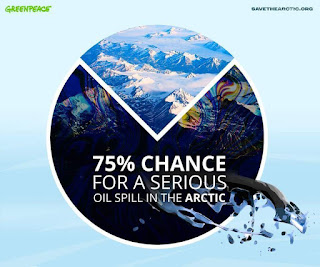Although the Obama administration has effectively shut down Arctic drilling the region is far from being protected from the dangers of fossil fuel extraction. The President has imposed stringent lease conditions on Arctic oil extraction but other Northern nations do not have such restrictive national laws. Countries including Russia and Norway continue to set their sights on Arctic oil.
Arctic drilling is a source of concern for many reasons including the risks of a spill. According to Greenpeace there is a 75 percent chance of a serious spill. This would prove catastrophic in this fragile and remote ecosystem.
There is also the overarching issue of emissions contributions at a time when we already have more known oil reserves that can be safely burned. According to the US Geological Society the Arctic holds up to 13 percent of the world’s undiscovered oil reserves. Ironically, global warming caused largely by fossil fuels makes Arctic drilling even more attractive as there is now less ice to contend with.
Shell withdrew from the Arctic because the project became non-viable due to low oil prices. Citing "current market conditions" the Department of Interior has canceled two future auctions of Arctic offshore oil leases in the Chukchi and Beaufort seas. They have also denied requests from Shell and other oil companies to secure more time on their existing leases. They have also indicated that existing leases will not be renewed after their expiration in 2020.
The Obama administration appears to have brought Arctic drilling to an end for the remainder of the President's term. Further, all the leading Democratic contenders for president have indicated that they are against Arctic drilling. However, this does not preclude a return of oil companies to the American Arctic at some future date. If a Republican were to take control of the white house we would almost certainly see such a return. Republicans in Congress, including Alaska's Lisa Murkowski have already made it clear that they want to extend the life of drilling leases.
While US companies may lead the race to extract Arctic oil, other countries are also looking to exploit the regions fossil fuel reserves. Russia's Arctic drilling operations have been delayed by sanctions over the Ukraine, however early in 2015 cooperation between Russian and Norwegian oil companies suggested that Arctic drilling would proceed despite the sanctions.
For example, the Norwegian company Statoil has increasingly close relations with the Russian oil company Rosneft and together they are planning to drill four wells in Russia. Rosneft has a stake in a license in the Barents Sea operated by Statoil. Russia's second biggest oil producer Lukoil is also working with Norwegian and Swedish firms.
It is only due to tensions over the ownership of the remote Arctic Svalbard islands that we are not seeing even more Arctic drilling cooperation between Norway and Russia.
Related
What Activists can Learn from Shell's Arctic Retreat
Obama Administration Cuts Shell's Arctic Drilling in Half
The Unacceptable Risks of Arctic Drilling
Video - The Arctic is Under Threat from Shell and Gazprom
The Race to Exploit the Arctic's Resources Ignores the Costs
Oil Spills in Arctic Waters (White Paper)
Shell Pauses its Arctic Drilling for 2013
Video of the Oil Rig Belonging to Shell that Ran aground in Alaska
Shell Oil Rig Runs Aground in Alaska Raising Safety Concerns
Shell's Game with the Future of the Arctic
Lawsuit Protecting the Arctic from Oil and Gas
Home
Arctic
crude
danger
destructive
ecosystem
exploitation
extraction
extractives
Far North
fragile
harm
hydrocarbons
north
Oil
petrochemicals
risk
The Arctic is still not Safe from Drilling
- Blogger Comment
- Facebook Comment
Subscribe to:
Post Comments
(
Atom
)

0 comments:
Post a Comment